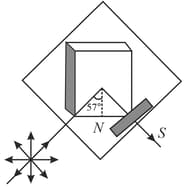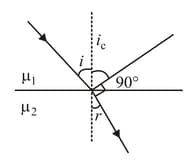Brewster's Law
Important Questions on Brewster's Law
Ordinary light incident on a glass slab at the polarising angle suffers a deviation of $34^{\circ} .$ The value of the angle of refraction in glass in this case is
Assertion: If the light is polarised by reflection, then the angle between reflected and refracted ray is
Reason: Brewster's law: .
$\lambda_{\mathrm{a}}$ and $\lambda_{\mathrm{m}}$ are the wavelengths of a beam of light in air and medium respectively. If is the polarising angle, the correct relation between $\lambda_{\mathrm{a}}, \lambda_{\mathrm{m}}$ and $\mathrm{i}_{\mathrm{p}}$ is
A ray of light travelling in impure water is incident on a glass plate immersed in it. When the angle of incidence is $51^{\circ},$ the reflected ray is totally plane polarised. Given that refractive index of impure water is $1.4 .$ The refractive index of glaiss should be $\quad\left(\tan 51^{\circ}=1.235\right)$
The angle of polarisation for any medium is $60^{\circ} .$ What will be the critical angle for this?
The relation between the polarising angle and the critical angle is
The angle of incidence at which reflected light is totally polarise for reflection from air to glass (refraction index ) is
Light is incident at an angle $i$ on a glass slab. The reflected ray is completely polarised. The angle of refraction is
The polarising angle for transparent medium is is the speed of light in that medium. Then the relation between and is ( is velocity of light in air)
A ray of light is incident at an angle i on a glass slab of refractive index The angle between reflected and refracted light is Then the relationship between i and is
The Brewster angle for the glass-air interface is $54.74^{\circ} .$ If a ray of light going from air to glass strikes at an angle of incidence $45^{\circ}$, then the angle of refraction is (Hint: $\left.\tan 54.74^{\circ}=\sqrt{2}\right)$
The polarizing angle of glass is $57^{\circ} .$ A ray of light which is incident at this angle will have an angle of refraction as
The deviation produced when light wave is incident on a denser medium with an angle of incidence equal to polarising angle is $24^{\circ} .$ The angle of incidence is
Unpolarised light is incident from air on a plane surface of a material of refractive index . At a particular angle of incidence , it is found that the reflected and refracted rays are perpendicular to each other. Which of the following options is correct for this situation?
From Brewster's law, except for polished metallic surfaces, the polarising angle
Figure represents a glass plate placed vertically on a horizontal table with a beam of unpolarised light falling on its surface at the polarising angle of with the normal. The electric vector in the reflected light on screen will vibrate with respect to the plane of incidence in a

When unpolarised light is incident on a plane glass at Brewster's angle, then which of the following statements is correct?
The correct relation for the diagram shown below is,

A ray of light is incident on the surface of a glass plate of refractive index at polarizing angle. The angle of refraction is,
When the angle of incidence on a material is , the reflected light is completely polarized. The velocity of the refracted ray inside the material is ,

